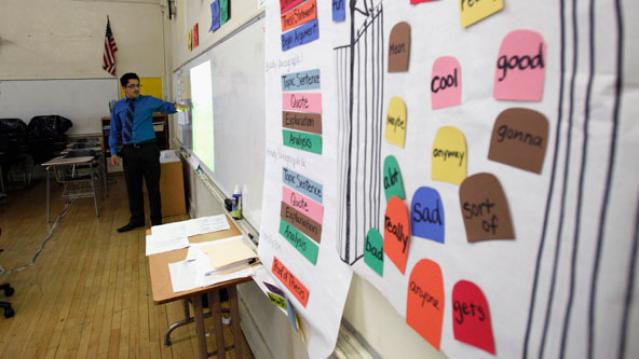Why We’re Wasting Billions on Teacher Development

School districts spend an average $18,000 per year on teacher development, and teachers devote about 10 percent of their time to professional learning, but a new report finds that such programs may not be producing any measurable results.
The report, released today by TNTP, a nonprofit aimed at addressing educational equality, finds even with development programs, teachers do not show much improvement year over year, and the performance for the vast majority (70 percent) remained constant or declined over the past two to three years.
The report’s authors believe the lack of improvement stems from low expectations for teacher development and performance, and they suggest that schools need to rethink completely the ways that they measure teacher performance and the way they conduct student development.
Related: The Education Department Is Failing Students Who Got Defrauded
The study evaluated information on more than 10,000 teachers at three large school districts and a charter network covering nearly 400,000 students.
The authors report that teachers who do show improvement do not appear to be the result of deliberate, systemic efforts, and show no clear patterns that could improve development for others. “The absence of common threads challenges us to confront the true nature of the problem,” they write. “That as much as we wish we knew how to help all teachers improve, we do not.”
Rather than offer specific solutions, the authors suggest that schools redefine professional development, re-evaluate professional learning programs, and reinvent the ways they support teachers.
Top Reads from The Fiscal Times:
- Teens Are Having Much Less Sex Than Their Parents Did at That Age
- The 2016 Presidential Election Is Already a Dumpster Fire
- You’re Richer Than You Think. Really.
Marco Rubio Says There’s No Proof Tax Cuts Are Helping American Workers

Sen. Marco Rubio (R-FL) told The Economist that his party’s defense of the massive tax cuts passed last year may be off base: “There is still a lot of thinking on the right that if big corporations are happy, they’re going to take the money they’re saving and reinvest it in American workers,” Rubio said. “In fact they bought back shares, a few gave out bonuses; there’s no evidence whatsoever that the money’s been massively poured back into the American worker.”
For Richer or Poorer: An Updated Marriage Bonus and Penalty Calculator

The Tax Policy Center has updated its Marriage Bonus and Penalty Calculator for 2018, including the new GOP-passed tax law. The tool lets users calculate the difference in income taxes a couple would owe if filing as married or separately. “Most couples will pay lower income taxes after they are married than they would as two separate taxpayers (a marriage bonus), but some will pay a marriage penalty," TPC’s Daniel Berger writes. “Typically, couples with similar incomes will be hit with a penalty while those where one spouse earns significantly more than the other will almost always get a bonus for walking down the aisle.”
Trump Administration Wants to Raise the Rent

Housing and Urban Development Secretary Ben Carson will propose increasing the rent obligation for low-income households receiving federal housing subsidies, as well as creating new work requirements for subsidy recipients. Some details via The Washington Post: “Currently, tenants generally pay 30 percent of their adjusted income toward rent or a public housing agency minimum rent not to exceed $50. The administration’s legislative proposal sets the family monthly rent contribution at 35 percent of gross income or 35 percent of their earnings by working 15 hours a week at the federal minimum wage -- or approximately $150 a month, three times higher than the current minimum.” (The Washington Post)
New Push for Capital Gains Tax Cut

Anti-tax activists in Washington are renewing their pressure on lawmakers to pass new legislation indexing capital gains taxes to inflation. The Hill provided an example of such indexing that Grover Norquist recently sent to Treasury Secretary Steven Mnuchin: “Under current policy, someone who made an investment of $1,000 in 2000 and sold it for $2,000 in 2017 would pay capital gains taxes on the $1,000 difference. But if capital gains were indexed, the investor would only pay taxes on $579, since $1,000 in 2000 would be equivalent to $1,421 in 2017 after adjusting for inflation.” Proponents of indexing say it’s just a matter of fairness, but critics claim that it would be just another regressive tax cut for the wealthy. Indexing would cost an estimated $10 billion a year in lost revenues. (The Hill)
Bernie Sanders to Propose Plan Guaranteeing a Job for Every American

Sen. Bernie Sanders (I-VT) is preparing to announce a plan for the federal government to guarantee a job paying $15 an hour and providing health-care benefits to every American “who wants one or needs one.” The jobs would be on government projects in areas such as infrastructure, care giving, the environment and education. The proposal is still being crafted, and Sanders’ representative said his office had not yet come up with a cost estimate or funding plan. Sen. Kirsten Gillibrand (D-NY) last week tweeted support for a federal jobs guarantee, but Republicans have long opposed such proposals, saying they would cost too much. (Washington Post)
